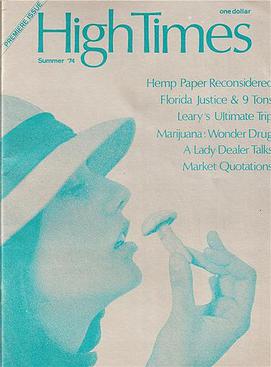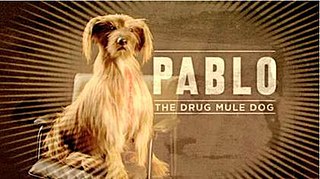Related Research Articles

Harm reduction, or harm minimization, refers to a range of intentional practices and public health policies designed to lessen the negative social and/or physical consequences associated with various human behaviors, both legal and illegal. Harm reduction is used to decrease negative consequences of recreational drug use and sexual activity without requiring abstinence, recognizing that those unable or unwilling to stop can still make positive change to protect themselves and others.

Patrick Joseph Kennedy II is an American politician and mental health advocate. From 1995 to 2011, he served as a Democratic member of the United States House of Representatives from Rhode Island's 1st congressional district, and was the first Generation X member of congress when he was elected in 1995. He is a former member of the Opioid and Drug Abuse Commission and a co-founder of One Mind, a mental health nonprofit.

High Times is an American monthly magazine that advocates the legalization of cannabis as well as other counterculture ideas. The magazine was founded in 1974 by Tom Forcade. The magazine had its own book publishing division, High Times Books, and its own record label, High Times Records.

Marc Scott Emery is a Canadian cannabis rights activist, entrepreneur and politician. Often described as the "Prince of Pot", Emery has been a notable advocate of international cannabis policy reform, and has been active in multiple Canadian political parties at the provincial and federal levels. Emery has been jailed several times for his cannabis activism.
Commonly-cited arguments for and against the prohibition of drugs include the following:
Jon B. Gettman is a marijuana rights activist, a leader of the Coalition for Rescheduling Cannabis, and a former head of the National Organization for the Reform of Marijuana Laws. He has a PhD in public policy and regional economic development from George Mason University and is a longtime contributor to High Times magazine. Gettman filed a petition in 1995 to remove cannabis from Schedule I of the Controlled Substances Act that was eventually denied. A second petition was filed in 2002, with the Coalition for Rescheduling Cannabis, that remains under review by the Department of Health and Human Services. Gettman frequently publishes on the marijuana industry and is an associate professor of Criminology and Criminal Justice at Shenandoah University in Virginia.
The legal status of cocaine varies worldwide. Even though many countries have banned the sale of cocaine for recreational use, some have legalized it for possession, personal use, transportation, and cultivation, while some have decriminalized it for certain uses. It is necessary to distinguish cocaine from coca leaves or the plant itself.
Salvia divinorum, a psychoactive plant, is legal in most countries. Exceptions, countries where there is some form of control, include Australia, Belgium, Brazil, Canada, Denmark, Estonia, Finland, Germany, Iceland, Ireland, Italy, Japan, South Korea, Norway, Poland, United Kingdom, Ukraine, Spain, Sweden, Armenia and 33 states and territories of the United States.

A Cannabis Social Club (CSC), sometimes called Cannabis Club, Cannabis Association, or Teapad, is an industry model for regulated cannabis organised as non-profit cooperatives in which cannabis is cultivated, shared, and enjoyed collectively, usually for the purpose of relaxing or for social communion.
Greg "Greggo" Williams is an American former radio personality. Williams was most recently co-host of the sports talk program RAGE with Richie Witt. It aired at 2pm-7pm on KRLD-FM, "The Fan" 105.3, in Dallas, Texas. Williams first became popular as 'The Hammer', Mike Rhyner's partner on KTCK's top-rated The Hardline drivetime show, but his tenure there ended abruptly in 2008 after 13 years on the air.
Adult lifetime cannabis use by country is the lifetime prevalence of cannabis use among all adults in surveys among the general population. Lifetime prevalence means any use of cannabis during a person's life.

Pablo the Drug Mule Dog is the main character in a series of anti-cocaine television advertisements produced by the agency Mother for FRANK, the United Kingdom government's national anti-drug campaign. Pablo is rumoured to be named after Pablo Escobar, who was head of the Medellin cartel.

Mark S. Gold is an American physician, professor, author, and researcher on the effects of opioids, cocaine, tobacco, and other drugs as well as food on the brain and behavior. He is married to Janice Finn Gold.

Cannabis drug testing describes various drug test methodologies for the use of cannabis in medicine, sport, and law. Cannabis use is highly detectable and can be detected by urinalysis, hair analysis, as well as saliva tests for days or weeks.
Most of the illegal drugs in Pakistan come from neighbouring Afghanistan. The unemployment rate in Pakistan is influenced by the presence of low-skilled graduates and the overall poor quality of education.
Cannabis in Latvia is illegal for recreational and medical purposes, but production of industrial hemp is permitted.
The list includes and details significant events that occurred in the global history of national-level implementations of, or changes made to, laws surrounding the use, sale, or production of the psychoactive drug cannabis.
Discrimination against drug addicts is a form of discrimination against people who suffer from a drug addiction.
References
This article includes a list of general references, but it lacks sufficient corresponding inline citations .(July 2022) |
- "FRANK review 2004-06 - Home Office review". 2007-02-21. Archived from the original on 2008-02-09.
- "FRANK - Drug Awareness Campaign - Programme information". European Monitoring Centre for Drugs and Drug Addiction. Archived from the original on 2011-07-27. Retrieved 2009-02-11.
- "Critical comment on FRANK cannabis information". Archived from the original on 2007-12-29. Retrieved 2007-12-04.
Notes
- ↑ "'Frank' anti-drugs drive backed". BBC News. 2003-05-23. Archived from the original on 2007-09-13. Retrieved 2007-07-11.
- ↑ "Treatments for drug and alcohol addiction | Topics, Drugs and Alcohol, Young People's Experiences | healthtalk.org". Youthhealthtalk.org. Archived from the original on 2013-09-23. Retrieved 2017-01-30.
- ↑ "Advertising (media), Media, Society, Mental health (Society), Young people (Society)". The Guardian. London. 2009-02-16. Archived from the original on 2016-09-27. Retrieved 2016-12-14.
- ↑ "Frank news | The latest stories and articles. | FRANK". Talktofrank.com. 2016-05-26. Archived from the original on 2011-09-27. Retrieved 2017-01-30.
- ↑ "FRANK". Talktofrank.com. 2016-05-26. Archived from the original on 2017-01-28. Retrieved 2017-01-30.
- ↑ "FRANKCocaine's Channel". YouTube. Archived from the original on 2010-03-17. Retrieved 2016-07-28.
- ↑ "Talk to FRANK". Archived from the original on 2011-06-04. Retrieved 2011-06-12.
- ↑ Brain Warehouse at IMDb
- ↑ Donaghy, James (10 January 2009). "The Hard Sell: Pablo the drug mule dog". The Guardian. London. Archived from the original on 6 March 2016. Retrieved 20 May 2010.
- ↑ "UKCIA - The document FRANK had to withdraw". Archived from the original on 2008-05-06. Retrieved 2008-04-04.
- ↑ "KFX Drugs Blog - Frankly Unnacceptable". Archived from the original on 2008-04-03. Retrieved 2008-04-04.
- ↑ "Talk to Frank "failed"". Archived from the original on 2011-07-25. Retrieved 2011-06-12.
- ↑ The Centre for Social Justice. "Addiction - The Centre of Social Justice" (PDF). Centreforsocialjustice.org.uk. Archived from the original (PDF) on 2012-09-06. Retrieved 2017-01-30.